Until last week we had a waist-high, white, square pedestal in our house, part of a “mud bench” that we installed when moving in. There was the bench itself to sit while taking off shoes, a wall of hooks for jackets, and shelves for hats and gloves. The top of the pedestal was where we put the loose stuff that didn’t fit anywhere else. Ordinary things going and coming: Overdue library books, empty cartons to refill with Jen’s local organic eggs, unopened mail, and a basket for keys.
For years the pedestal always had something going to or coming from my aunt Clarice. Clarice lived in town in Stonehenge off Rio Road, and we saw her a lot, which meant regular accumulations of Tupperware that had brought leftovers from a dinner at her house or something she’d baked and dropped off like her million dollar bars. And fruit. Lots of fruit. She and my wife would swap fruit from the farmer’s market or Aldis (Clarice loved Aldis) because who can use so many pomegranates themselves?
Clarice dropped by every week or so on the way to fire a pot at PVCC or on the way back from a swim lesson. If I was home she’d come in, calling in a singsong Hellohello?, with a canvas tote bag printed with a PBS logo or JMRL logo. She’d unpack heart of palm noodles, an extra mango, or Washington Post crosswords—when I was doing Washington Post crosswords.
This year we decided to redo the room and last week I tore it out. Jen put the whole shebang on Buy Nothing, and a nice couple carted it off.
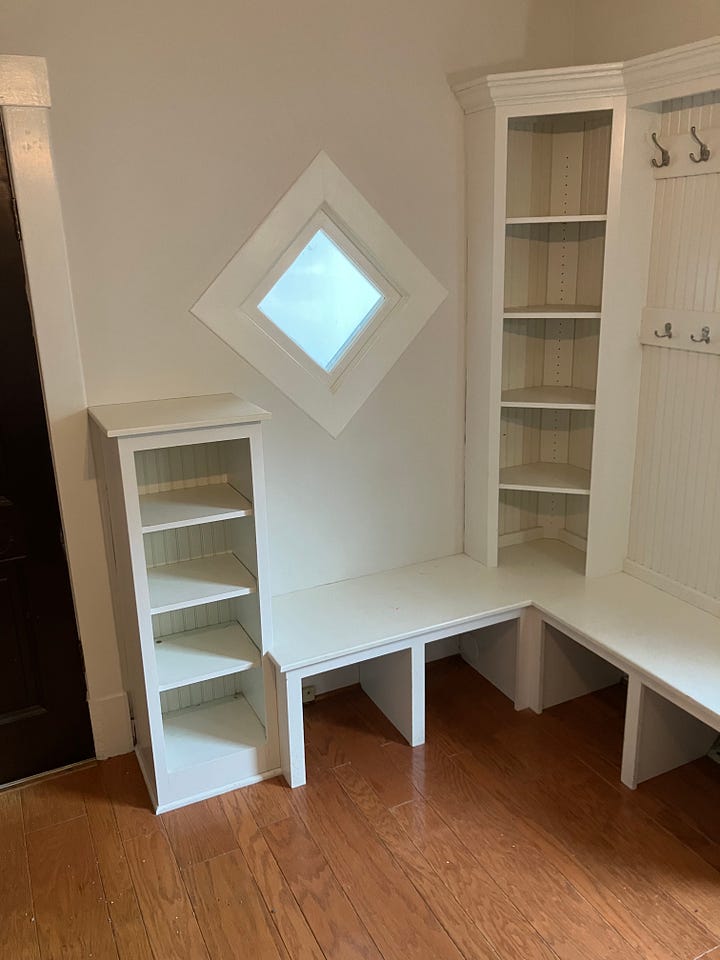
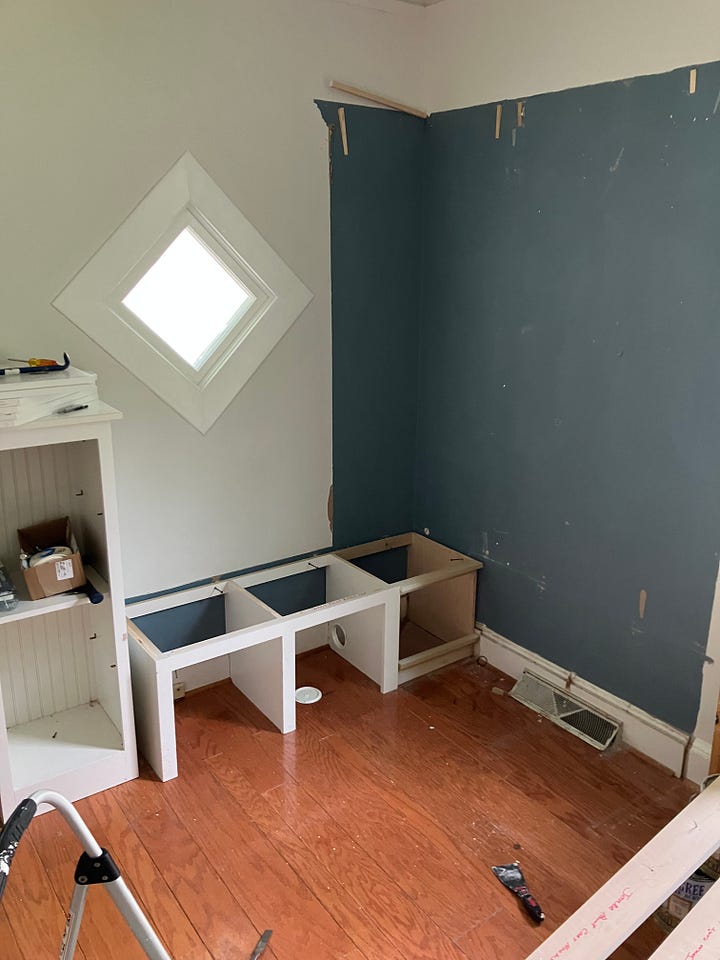
Aunt Clarice was tall with perfect posture, a nutmeg tan, freckles, and chiselled dimples. In pictures she had long, straight hippie hair, and I knew her then, but I only remember her with short hair. Her straight stubborn hair never really cooperated with any other hairstyle and those short hair cuts overwrote all my early memories of her. She was cheerful, kind, tidy, and enthusiastic. She never got sick a day in her life until she got cancer.
Her family pronounced her name to rhyme with Ferris as in Ferris Wheel, though many in Charlottesville mispronounced it in the French way with an accented second syllable -eece, or just called her Claire.
Clarice Zillmer was born in 1945, the eighth of nine children, to a very German farming family in Shell Lake, Wisconsin. She often shared stories of farm life, attending a one-room schoolhouse in the 1950s, her father and older brothers’ daily chores, and her mother’s cooking and baking. After dropping out of college in Wisconsin she was prodded by her oldest brother, Lawrence Zillmer, a brother so much older she barely knew him, to move to Hattiesburg, Mississippi and live with his family and finish school at the college where he was an adjunct professor in English or Drama (I’m not sure which). Lawrence Zillmer was my biological father.
So Clarice moved in with Lawrence, my mom, my brother Bret, two half-brothers by an earlier marriage, me, and various boarders whom my mom crowded into the house for her own sense of safety. She was scared of one of those step-sons her Lawrence himself, the story isn’t clear.
Then the boarders graduated and left. John Jones, a friend from an earlier college, was drafted to serve in Vietnam. Clarice went off to serve in the Peace Corps.
So my mom fled. She took Bret and me and moved to Charlottesville where her own aunt and uncle, Barbara and Bill Pace, were willing to help out a divorced single mom.
I knew Clarice from the time I was born—I don’t ever remember not knowing her—and she lived with us in Mississippi, but my first vivid memories of her were in Charlottesville. After she left the Peace Corps she followed us here, landing a job teaching Home Economics with the city schools, and she moved into the same apartment complex.
Mom was managing Barracks Road Apartments at the time, and a perk was that we got to live there for free, so long as we moved into whatever unit was empty—which was heaven for Bret and me! My favorite unit was a second-floor flat with a balcony in back because through the black cast-iron railing Bret and I could see the rear of the next apartment block with the back patio of Clarice’s basement unit! Right there! So close! So amazing to my four-year-old self! Sometimes our mom would even let us go visit. On our own! Like a visit to a magic world of ceramics and hippie stuff.
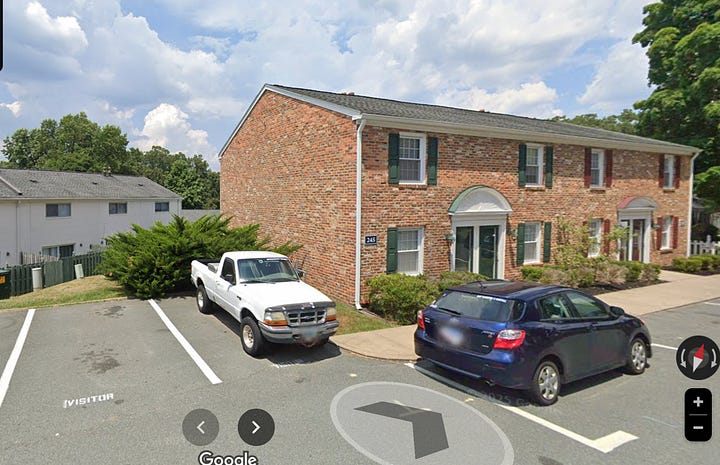
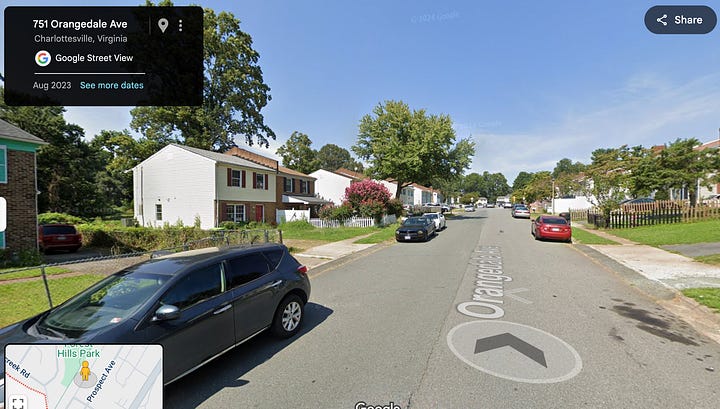
When John Jones came back from Vietnam, my mom married him and she, Bret, and I moved to Laurens, South Carolina. I’d known John Jones since I was a baby, and I adored him, and was ecstatic to have such a great dad and be a family together in Laurens. Even in middle school when he died but I still was happy to be in the town where he lived and where his family accepted me as their own. Clarice visited too, and after John Jones died she even went on vacations with us. I was always excited to see her, but I wasn’t her favorite then. I had bad asthma and it irritated her that I would cough and snort and keep everyone awake in our shared motel rooms. Also she liked to play cards with us and I was a poor loser. She would tease me in her Peace-Corps Spanish for my whining and whinging. Pobrecito.
By 1978 my mom had grown tired of being a widow in Laurens, so we moved back to Charlottesville, and she bought us a house in Johnson Village off Cherry Avenue. By then Clarice had bought her first home too, a two-floor duplex in nearby Orangedale, where she lived with two cats.
There was a small bridge that connected the two neighborhoods at the end of Antoinette Avenue. Clarice would often visit on Saturday walks, and sometimes I remember walking to visit her too. I was starting high school so I’d also see her at CHS too where she still worked. (She had switched from teaching to being a guidance counselor.) We were closer by then and I housesat for her once during a summer week when she was off traveling. The two cats hid for the entire time. I was worried they’d somehow run away. Turns out they just didn’t like me, which was a relief. For my junior year in college I was off to study in Athens, Greece, and Clarice gave me two journals to write in before I left. I kept up with one until I got a girlfriend at the end of the first semester. Then the writing stopped. But that was my first writing that wasn’t assigned by a teacher. She wanted me to show the journals to her afterwards, but I was too embarrassed.
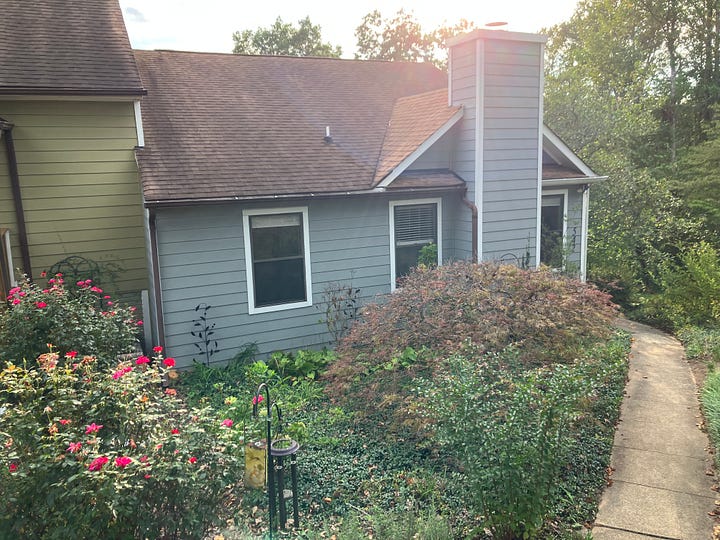
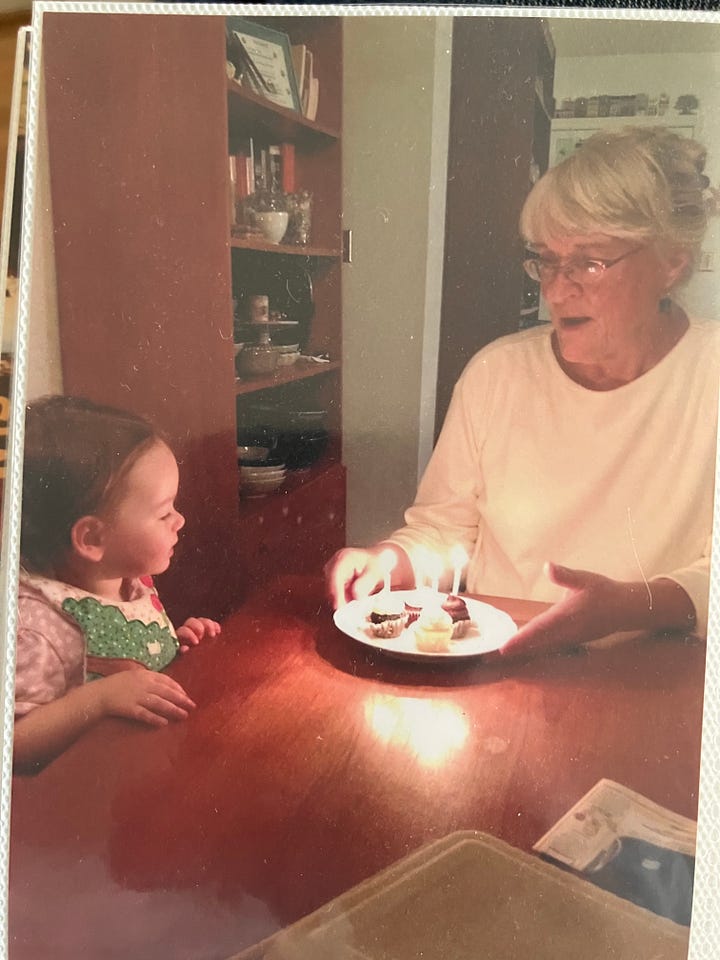
We first became really close in 1994. By then I’d finished college, dropped out of grad school, lived in New York, moved back to Charlottesville, gotten immersed in the budding art scene, fallen in love and out of love. In 1994 I had a ticket to Prague to maybe leave America forever or at least spend a year, and I had a couple weeks before my flight, so Clarice invited me to stay with her.
By then Clarice was living in Stonehenge off Rio Road. We had a good time. She was retired by then and I was in my late twenties. Every evening we started having long conversations about family and life and politics. Clarice loved conversations about family and life and politics. Whenever she realized we were getting too gossipy or too judgmental, she would sniff and say something self-deprecating like, Well, Joel, don’t we have all the answers.
I loved those conversations too, but what really brought us closer was the dishes. I don’t mean doing them together; I mean not doing them together. I was living in her guest room and being a slob. (I know, hard to believe.) I wasn’t cleaning up after myself particularly in the kitchen. It was laziness, yes, but not just laziness; I’m also scared of doing the wrong thing in other peoples’ houses, particularly women’s kitchens, so I would try to escape from the kitchen as quickly as possible to avoid doing anything wrong. That may not be believable, but that is the truth.
Well, one night we sat in the living room to start one of our conversations and instead of talking about family, life, and politics, Clarice said she had to talk to me about something. Her voice quivering and her hands moving nervously, she brought up the kitchen, and pointed out how I never cleaned up after myself. But she didn’t scold me. She didn’t say this is how people should be and you’re not living up to it. Instead she just told me that she felt hurt. She didn’t understand why I was not doing my share.
Since John Jones died I hadn’t experienced anyone in my family criticizing what I was doing without the scolding part. Seeing Clarice flustered, trying to find the words to say, made it seem like I was worth the effort, and that floored me. I was ashamed of not doing the dishes, but more than that it gradually it seeped into my soul that I was worth a lot of effort. I can’t say I’ve always been clean since then, but I’ve always been cleaner.
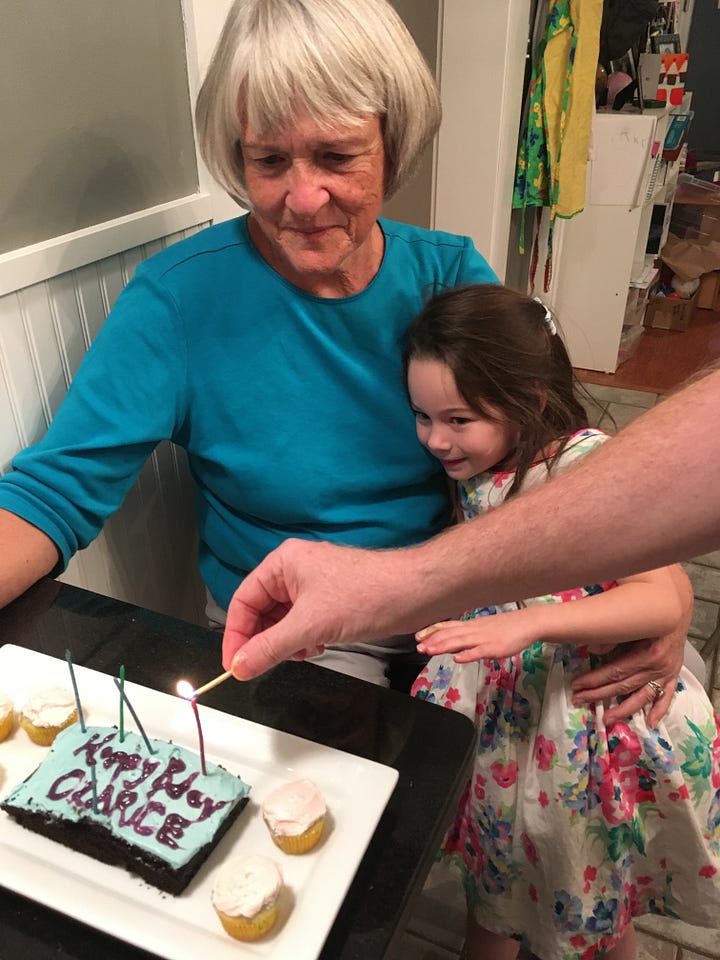
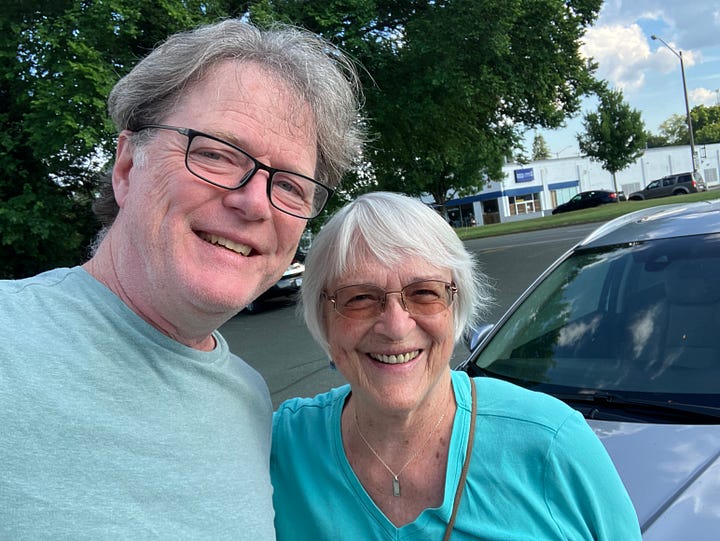
In 2012 Jen and I moved to Charlottesville with our six-month-old daughter Ellie. Clarice became a big part of our lives. Clarice babysat Ellie a lot. She was in the room when Ellie said her first word. By the time Elie was four or five she had regular sleepovers at Clarice’s house where Clarice would utterly spoil her. Jen and I would come to pick her up in the morning and Ellie would be at the table staring at tablet screen bleary-eyed with a pile of gummies and cheap toys they’d bought from Target. She never wanted to leave. Since we’re older parents and so many of our other relatives are older, Ellie took comfort in Clarice being the person she would live with if anything happened to Jen and I. Clarice was always so healthy, cheerful, and energetic, like Mary Poppins except she never made Ellie clean her room. Ellie liked being with her more than she liked being home.
But more important than spoiling Ellie, whenever Ellie wasn’t around, either out of earshot or if we were talking by phone, Clarice would tell us, You’re doing a good job. You’re doing a good job. Anyone who has raised a spirited child can vouch for how rare that praise is. Even those who don’t tell the parent of a spirited child they are doing everything wrong, show it in their looks. But Clarice repeated her praise and meant it day after day, year after year, in every conversation.
Just before Christmas in 2021 Clarice was diagnosed with ovarian cancer. Jen and I took turns staying with her through the first six months of 2022 during weeks when she had chemo. Her hair fell out and Ellie became terrified of her. It broke everyone’s heart, including Ellie’s.
Clarice rallied enough to traveled again, her hair grew back, and she and Ellie patched things up. But the cancer just wouldn’t go away. I was with her in the fall of 2024 when the doctor said there were no more medications in the tool kit, nothing else to try. Clarice was feeling pretty good at the time, and the doctor said that she should enjoy that. She might have six months or a year, maybe more, and when the disease came back that would be that.
The disease came back in early 2025. She died in her home in April. I’d been there the night before. She hadn’t been able to speak for a couple of days and was lying with her eyes were closed and her body so shrunken it barely visible under the blanket. I was holding her hand and singing to her, just making up songs like I used to do with Ellie when we ran out of her usual bedtime songs. It had been more than a day since she had any presence and I felt like she was gone except for her heart and lungs continuing by habit. So I asked Clarice if she wanted me to sing more, and she I felt her hand squeeze mine, so delicately but it was there. Some part of her was listening. So I sang more until I couldn’t anymore. I had to go home to wake up and make sure Ellie was at school on time. Which is what Clarice would have wanted me to do, I’m sure. Jen was there the next night for the death rattle and the death itself.
I don’t miss her everyday, since I didn’t see her that often when she was alive. But every few weeks I remember I haven’t seen Clarice in a while, and a pain envelopes me that I’ll never see her again. She’ll never drop by our house with figs or some other ridiculous fruit that no sane person would ever want to eat; We’ll never gossip about the family; She’ll never see Ellie grow up. She’ll never tell me I’m doing a good job again.
Thanks for reading Blame Cannon! That was the last of the Departure stories for awhile. For the next couple of months I’ll circle between a series on global warming in prehistory, a series of stories about my spotty job history, and the tale of the greatest social experiment in human history, the American postwar suburbs. Plus more!
Please subscribe and share!
Comments are welcome but please no personal insults or profanity.




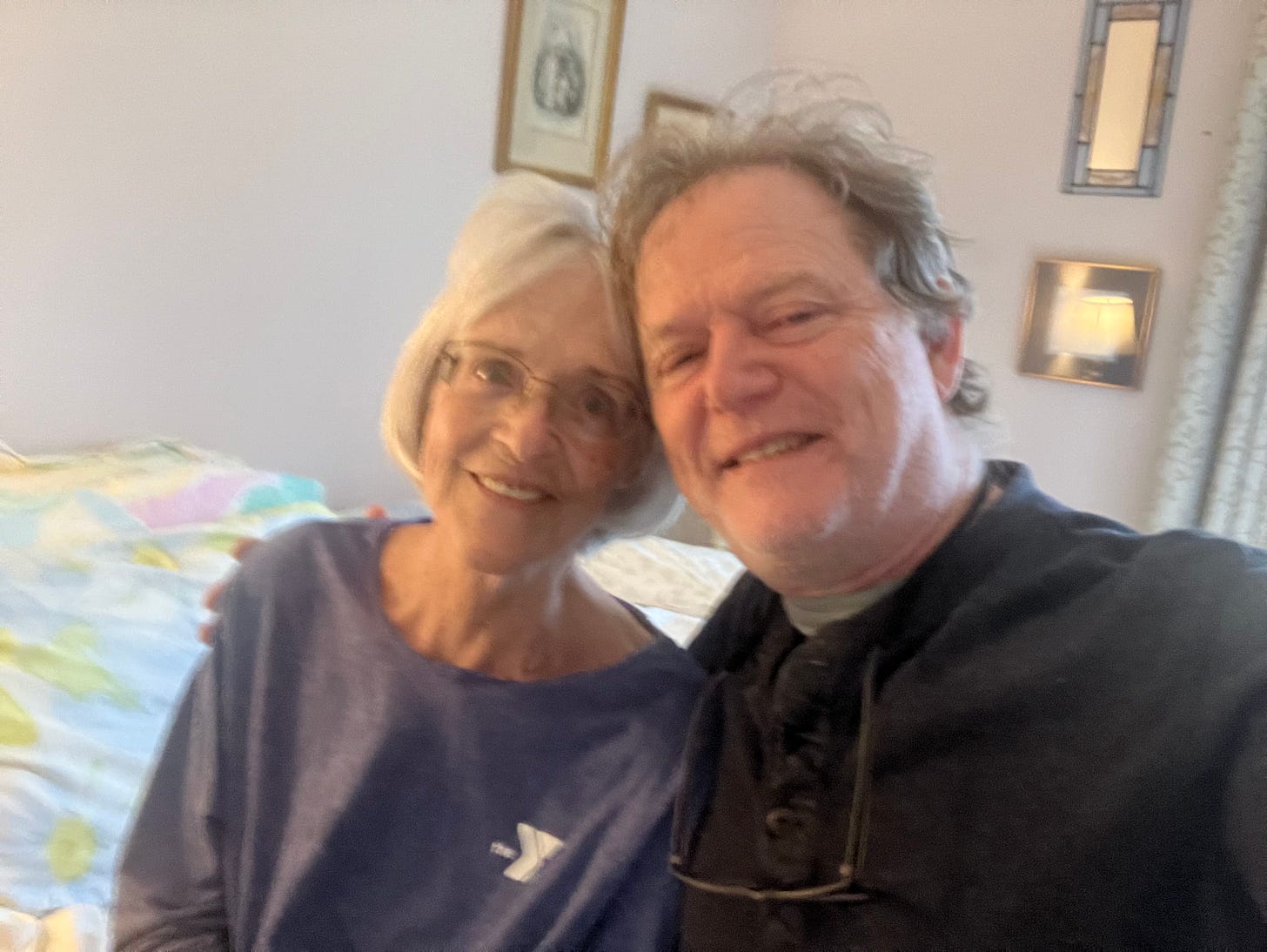
One of the things about being Gen X, especially the earlier end, is that we first experienced the Boomers not as parents or bosses but as these almost mystical creatures, who inhabited a world completely different from our ordinary home lives. Our parents had never done the things they did, never thought the way they thought, and neither did we. They were not cynical yet, not entrenched or entitled, just living among us like the Elves of Middle Earth, visitors from a strange yet not distant land